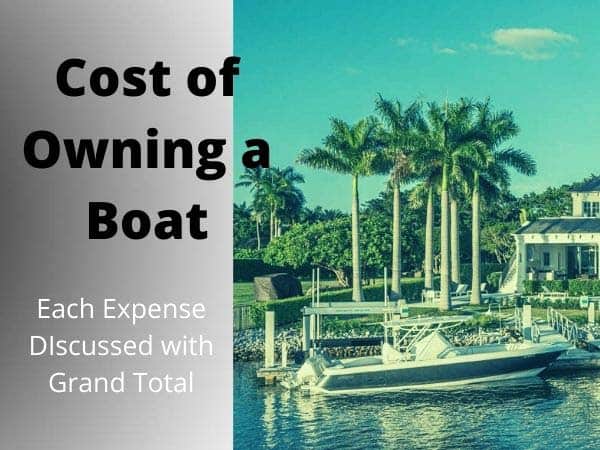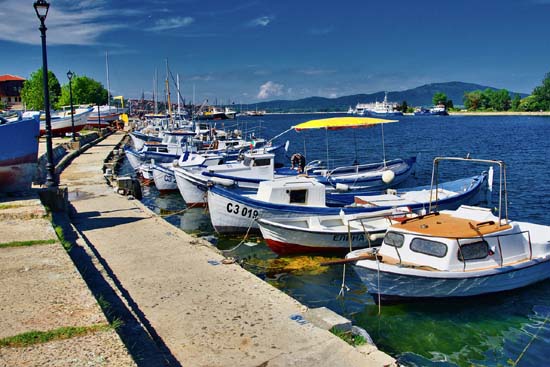Do you enjoy spending time on the water? If so, the thought of buying a boat is one that must have crossed your mind at some point. Before committing to buy a boat, make sure to first fully understand the cost of owning a boat. But given the significant investment you’ll be making to committing to but a boat, it won’t be a surprise if you’ve got second thoughts.

It’s important first to understand the costs involved to consequently enjoy an amazing experience on your boat. By doing this, you’ll be able to use your boat for watersports, cruising, and fishing while having a good time with your family and friends. Here’s in-depth coverage of all the things to consider when buying a boat.
Buying A Boat Cost
One of the most important things you need first to ask yourself is how much the boat costs. Knowing this is important because boat prices vary greatly depending on its size, type, condition, age, options, or whether it’s new or preowned.
The guiding factor to consider is understanding how much time you’ll spend on water and the activities you enjoy doing. With this in mind, you’ll be able to establish which type of boat best suits your needs.
Many financing options are making your dream of owning a boat a reality due to their surprisingly affordable rates. The interest rate paid for a pre-owned boat is usually higher than that of a new boat. Don’t forget to make a buying a used boat checklist before buying these boats.
Furthermore, if you place more money, the less money that’ll be spent on interest.
Taxes
The taxes paid on buying a boat varies from one state to another. For example, if you buy a boat in South Carolina, you’ll be required to pay the tax that’s 10.5% of the boat’s assessed annual value if it has been in the state for over 180 days. However, you won’t be required to pay any taxes for buying a boat in Rhode Island.
Insurance
Having boat insurance is vital if you’re a boat owner. With one, you can be sure that your boat investment should it be stolen, damaged, or involved in an accident, your hard-earned money isn’t lost.
The amount of money you pay for boat insurance varies and depends on numerous factors such as your accident history, the boat’s value, and the type of boat you own.
Therefore, it’s mandatory to have boat insurance coverage unless you’re planning to use your boat on a private lake on your personal property.
This is especially vital considering close to 5,000 recreational boats each year are involved in boat accidents. Therefore, it’s clear that the expenses you might face from a boating accident might be enormous.
Registration
The registration cost of boats varies from one state to another. If you’re looking to register a boat in New Jersey, be ready to spend over $250 for a boat that is longer than 65-feet.
Mooring (Bigger boat/small boat)
Knowing how much exactly the cost of mooring is can be quite challenging as it differs depending on the nature of a marine and the region.

Therefore, you’ll need to set aside enough time to do enough research to know how much exactly it’ll cost you every season.
How much you need to pay varies from several hundred dollars every month when storing a runabout in a municipal marina to one thousand or more dollars each month for a huge boat stored in a yacht club.
Many marinas charge a slightly lower fee for a long-term lease as opposed to the monthly payment. You might also qualify for a discounted price for areas with cooler climates if you choose a winter om-site storage option. Therefore, it’s advisable to always factor in winter lay-up expenses when doing your calculations.
Boats that are stored on trailers are also are subject to a certain level of storage expenses. This is because most urban trailer-boat owners prefer to have their boats at a secure storage facility. By doing this, you save yourself from the risk of having to deal with vandalism or theft, hence saving you money.
Furthermore, you’ll spend more on fuel expenses if you reside far from a boat ramp due to trailing the boat back and forth, unlike storing it near the water.
Another vital aspect of mooring you must consider is ensuring the proper securing of your boat. By not doing this, your boat might break free or get banged against pilings, and this, in the long-run, might necessitate you to spend more money on repair cost.
Trailer is Another Boat Owning Cost
If you want a trailer to transport your boats, this might increase its buying price and, in some cases, is included as a package of the deal. It’s something commonly practiced by boat shows, dealerships, and at seasonal dealer sale events. This is usually done in cases when the trailer translates to sale conversion for the dealer.
The trailer needs to be maintained to ensure its overall condition doesn’t get ruined. This entails inspecting the brakes, tires, general maintenance, and monthly storage fee if storing your boat in the water isn’t possible.
Winter Storage
If you live in the colder climates, setting aside money for winter storage is essential. This is because you’ll need to do boat winterization prep for your boat and engine. In addition to this, you’ll need to buy a sturdy cover to safeguard your boat from winter winds, rain, and snow, which might destroy your boat.
If you choose outside storage of your boat in winter, the cost of shrink-wrapping your boat averages between $10 to $15 per foot. Therefore, you’ll have to spend between $200 to $300 for a boat, which is 21 feet.
For inside rack storage, you’ll need to pay a lot more as this provides your boat with improved protection from the elements. This means the cost per foot is $50, meaning for the same 21 feet boat, you’ll pay around $1,000 in preparation for winter.
Maintenance Cost will Always be There
The cost of maintaining a boat varies depending on its age and size. However, everything you need to shop to maintain your boat successfully is the same. This means the routine inspection of essential parts such as safety equipment servicing, engine servicing, sail, and rig servicing, as well as winter and anti-fouling.
It also entails the repair of one-off issues, including hull damage, equipment failures, engine problems plus upholstery, and interior wood repairs.
If you’re into doing DIY repair tasks, there are some maintenance stuff you can do by yourself. Nonetheless, there are other issues that you’ll most certainly need help from a qualified professional. With that said, you need to know that maintain your boat costs money as well as time.
Therefore, you must never ignore time management when organizing contractors, keeping lists, carrying out administrative tasks such as annual mooring, and renewing an insurance cover.
Oil/Fuel Changes
Many boats use plenty of fuel, meaning you need to be ready to spend a substantial sum of money than what you spend on your vehicle. For example, assume the price per gallon is $2.50, with this much lower than the actual rate in most places.
If you go ahead and use an average of 25 gallons of fuel per hour, which is the average for fast boast cruising at speed, you’ll end up spending $300 for a five-hour trip. This translates to over $16,000 per annum if you’re using your boat more than once each week.
If you own a slower pontoon boat, the amount spent on gas is a lot lower. This is because most use about five gallons each hour, meaning the annual fee cost will be near $3,000 for a similar number of hours cruising on the water. Therefore, how much fuel you spend on your boat depends on the speed.
Safety Items
When buying a boat, you must always factor in the safety gear, including paddles, life jackets, signal flares, and horns.
If you’re looking to buy extra accessories, you shouldn’t pressurize yourself into buying everything simultaneously. Instead, you should buy things gradually with an excellent plan to buy an additional boat accessory every fall and spring.
The most popular accessories you should look to buy include watersports towing equipment, stereos, lighting, among many others. As you buy these items, make sure to spend your money wisely, and consequently, you’ll be able to enjoy great fun on your boat.
Navigation Equipment
Are you planning to take an overnight trip or venture far away from the port? If so, you’ll need to factor in the price of installing a GPS when assessing the cost of owning a boat.
For a low-end GPS, you’ll need to spend at least $200. Nonetheless, if you’re on a tight budget, installing a GPS isn’t necessary and should instead focus on sticking familiar waters.
Education And Boating Licenses
All states require you first to get a boating safety and education certificate to get permission to use the boat. The set requirements differ from one state to another, but these boat licenses might be finalized online in many cases.
Furthermore, this online boating license or education in many of the states is done by a third-party, with the cost ranging between $29 to $50. You’ll only be required to pay this amount once you’ve managed to complete the course successfully.
These boat courses are meant to present information on all boating aspects with the goal not to make it difficult but to raise awareness instead.
During the course, you’ll learn about the state boating regulations, navigation rules, ways to enjoy watersports, boating terminologies, and basics and ways of handling boarding emergencies. You’ll also need to consider administrative fee, which varies across states.
Grand Total For Cost of Owning a Boat
Once you factor in all the costs mentioned above, it’ll be easier to determine the actual cost of owning a boat. Here’s a breakdown of the costs you’ll need to pay.
The buying price of the boat: $20,000
Taxes: This amount differs from one state to another
Insurance: $300
Registration: Varied rates
Dock or Mooring Fees: This cost differs.
Little boat: $500
Trailer: $1,000
Winter Storage: $2,000
Maintenance: $2,000
Gas: Free
GPS: $500
Safety Kit: $500
Grand Total: $26,800
You’ll need to spend a total of $26,800 when buying the first year of a boat. In addition to this, you’ll be required to pay for the maintenance of your boat, which includes maintenance cost, winter storage, and insurance. All these costs total to $4,3000, which translates to $358 each month.
However, this cost doesn’t take into account dock or mooring fees, registration, and taxes. Therefore, a total of $26,800 doesn’t show the actual cost of owning a boat, which is greater than this.
It’s thus evident that buying a boat is an expensive investment, even though the monthly maintenance cost isn’t that bad. Either way, you still need to do a lot of thinking before deciding to buy a boat to avoid causing yourself financial strain.
Conclusion
Knowing the actual cost of owning a boat is essential before you go out to buy one. If you didn’t know about the costs involved, reading through this detailed article has offered you useful insights.
Therefore, now that you know about all the costs involved, it’ll be a lot easier to make an informed decision about whether buying a boat is a practical decision.


